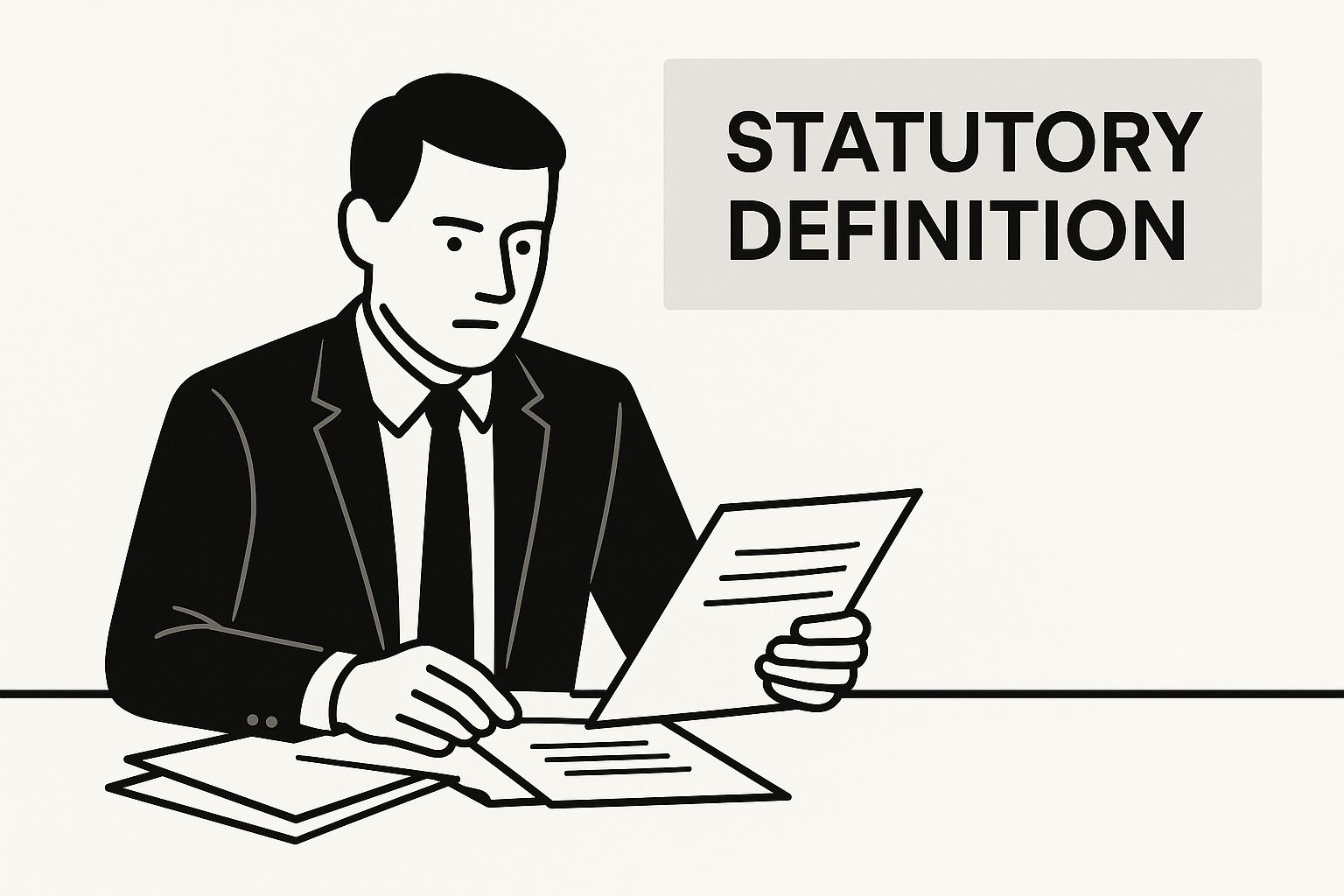Understanding India’s Statutory Employee Rules
When it comes to classifying workers in India, things aren’t always black and white. Beyond the straightforward categories of a standard employee or an independent contractor, there’s a unique middle ground: the statutory employee.
These are individuals who might have the independence of a contractor but are legally considered employees for specific, crucial benefits like Provident Fund contributions.
Decoding the Statutory Employee Status
In the world of work, not everyone fits neatly into the “employee” or “contractor” box. Indian labour laws get this. They’ve carved out a special category—the statutory employee—to make sure certain workers get the social security safety net they deserve, even if their roles look different on the surface.
Think of it like a hybrid vehicle. It runs on its own rules, blending the independence of a traditional petrol car with the specific protections of an electric one. This isn’t a status you can just choose; it’s determined by law, based on the actual work being done.
The whole point is to extend key benefits to these individuals under major Indian legislation, such as:
- The Employees’ Provident Fund (EPF) Act: This ensures mandatory contributions are made to a retirement savings fund.
- The Employees’ State Insurance (ESI) Act: This provides vital medical and cash benefits for workers and their families.
This infographic helps to visualise how this special definition creates a framework for classifying these unique workers.

As you can see, the law establishes a clear duty for employers. It bridges the gap between the freedom of a contract and the security of employment, ensuring specific benefits are provided.
Why This Classification Matters
Getting the statutory employee classification right is a big deal for everyone involved. For businesses, a mistake can lead to hefty legal trouble and financial penalties. For workers, understanding their status means they can claim the benefits they are legally entitled to.
The core principle here is protection. Labour laws define a statutory employee to stop companies from using contractor agreements as a loophole to sidestep providing essential social security benefits to people who, in reality, function like employees.
What really matters isn’t the job title on a piece of paper, but the actual nature of the work. The law lays out specific tests, looking at factors like how much control the employer has and how integrated the worker is into the business. At the end of the day, the responsibility for getting this classification right falls squarely on the employer’s shoulders.
Key Differences in Worker Classification
To make this clearer, let’s break down the main distinctions between a standard employee, an independent contractor, and a statutory employee. This table gives a quick snapshot of how they stack up in the Indian context.
| Attribute | Standard Employee | Independent Contractor | Statutory Employee |
|---|---|---|---|
| Control | High degree of employer control over work | High degree of autonomy; controls own work | Varies; some control but defined by statute for benefits |
| Legal Status | Full-time or part-time employee under a contract of service | Self-employed professional under a contract for service | Treated as an employee for specific laws (EPF, ESI) |
| Social Security | Entitled to EPF, ESI, gratuity, and other benefits | Not entitled to statutory social security benefits | Mandatorily covered under EPF and ESI Acts |
| Taxation | TDS deducted under Section 192 (Salaries) | TDS deducted under Section 194J/194M (Professional Fees) | TDS under Section 192; treated as salary for tax purposes |
| Integration | Fully integrated into the organisation’s structure | Operates independently, often for multiple clients | May work independently but is key to the business operation |
This comparison highlights that the statutory employee is a truly unique category. While they share some traits with contractors, the law steps in to grant them employee-like protections in the areas that matter most for long-term security.
Who Qualifies Under Statutory Employee Rules
Figuring out who counts as a statutory employee is a big deal for any business in India. It’s not about job titles or what’s written on a contract. Instead, Indian labour law digs into the real, day-to-day relationship between the worker and the company. The law gets the final say, and it’s a classification you can’t just opt out of.
It really boils down to two things: how much control the company has over the worker, and how essential that worker is to the company’s main business. To be considered a statutory employee, a person’s work has to fit the definitions in key laws like the Employees’ Provident Fund (EPF) Act and the Employees’ State Insurance (ESI) Act. This is to make sure people who are employees in all but name get the social security benefits they’re entitled to.
Core Categories of Statutory Employees
While there’s no single, exhaustive list, some roles almost always tick the box for being a statutory employee in India. The law is looking for workers who might seem like independent contractors on the surface but really depend on one main employer to make a living.
Some classic examples include:
- Commission Agents or Representatives: Think of people hired to bring in business, often paid purely on commission. If they’re working mostly or only for your company, they’re probably statutory employees.
- Piece-Rate Home Workers: These are individuals who get raw materials from a company to create products at home. Their pay is based on how many items they make, not the hours they work.
- Drivers and Transport Staff: This includes drivers using vehicles provided or owned by the company to move goods or people as part of the business.
The common thread here is dependency. Even if someone uses their own small tools or sets their own hours, if their work is a core part of the business and they’re supervised by the employer, they’re almost certainly a statutory employee.
The Deciding Factors
To get this right, you have to look past the paperwork and see what the working arrangement is really like. The authorities will look closely at the practical side of things to see if it’s a case of “disguised employment.”
Ask yourself these questions:
- Does our company provide the main equipment or materials needed to do the work?
- Does the worker have a major personal investment in the tools they use for the job?
- Is the worker restricted from taking on jobs for other companies?
- Is their work a continuous, regular part of our business operations?
If you’re answering “yes” to questions about company control and “no” to questions about worker independence, you’re looking at a statutory employee. That means they must be enrolled in the EPF and ESI schemes, no two ways about it.
Navigating Statutory Benefits and Employer Duties

Knowing who qualifies as a statutory employee is just the first hurdle. The real challenge—and legal test—is managing the responsibilities that come with it. This specific classification isn’t just a label; it triggers non-negotiable duties for employers, centred around India’s mandatory social security benefits.
The two pillars of these benefits are the Employees’ Provident Fund (EPF) and the Employees’ State Insurance (ESI) scheme. Let’s be clear: these aren’t optional perks or nice-to-haves. They are foundational legal rights for every statutory employee, and failing to comply can land a business in serious legal and financial trouble.
For many professionals, these benefits are a huge part of their overall compensation. Take the tech sector, for instance. A software developer at a company with 20 or more employees will almost certainly be classified as a statutory employee. This means they are entitled to EPF contributions, where both the employer and employee chip in 12% of the basic salary, and ESI coverage if their monthly pay is under ₹21,000. It’s a cornerstone of their employment.
The Employer’s Compliance Playbook
For any business, the best approach is to treat this like a strict compliance checklist. It’s squarely on the employer’s shoulders to handle every administrative detail accurately and on time. This isn’t just about ticking boxes; it’s about safeguarding both your company and your people.
Here are the key duties you absolutely have to get right:
- Accurate Payroll Deductions: You must calculate and withhold the employee’s share for EPF and ESI from their salary with precision, every single pay cycle.
- Timely Remittance: The money you deduct, plus your own company contribution, has to be deposited with the EPFO and ESIC by their set deadlines. No excuses.
- Meticulous Record-Keeping: You’re required to keep detailed, organised records of all contributions, payments, and employee details. These will be crucial for any audits or inspections.
Think of it this way: the employer acts as a trustee for these funds. That money is legally earmarked for the employee’s future security and healthcare. Any mistake or delay is a breach of that trust—and a violation of the law.
Getting these duties right is a fundamental part of being an employer in India. For a deeper look at your obligations, check out our guide on how to be a compliant https://taggd.in/employer/. Staying diligent doesn’t just protect your business from penalties; it shows your workforce you’re committed to their well-being.
Tax Implications for Employees and Employers
The special classification of a statutory employee brings a unique set of tax responsibilities for both the individual and the business. It’s a bit of a hybrid situation. Unlike an independent contractor, whose payments usually fall under Tax Deducted at Source (TDS) for professional fees (Section 194J), a statutory employee is treated much like a regular employee for tax purposes.
This means employers are required to deduct TDS from their pay under Section 192 of the Income Tax Act—the same section used for salaried staff. In practice, this involves estimating the employee’s annual income, accounting for any declared deductions or investments, and then withholding the correct amount of tax from their monthly payments. The company is then responsible for remitting this TDS to the government and filing its quarterly TDS returns on time.
The Employee’s Perspective on Taxes
So, what does this look like for the employee? One of the big pluses is that their social security contributions, like EPF and ESI, are handled before taxes are calculated. Their final take-home pay is what’s left after these statutory deductions and TDS are taken out. It’s a structured system that brings peace of mind, ensuring their retirement and health funds are consistently taken care of.
But here’s where things get interesting. A statutory employee often has more flexibility than a standard salaried person when it comes to claiming business-related expenses. While a regular employee’s deductions are quite limited, a statutory employee can frequently deduct costs essential to performing their job, which can lower their overall tax burden much like a freelancer can.
For the employer, getting this right is a matter of strict compliance. If you misclassify tax obligations—say, by applying the wrong TDS section—you risk getting a notice from the Income Tax Department, along with interest and penalties. Accurate payroll processing isn’t just good practice; it’s non-negotiable.
Getting a handle on these tax details is vital for everyone involved. Correct classification and tax handling don’t just keep you on the right side of the law; they also help build a skilled and secure workforce, a hot topic in the latest skills report. You can find out more by reading the India Skills Report 2023.
The High Cost of Incorrect Worker Classification

Thinking you can save a few bucks by classifying a statutory employee as an independent contractor? Think again. This isn’t just a minor administrative slip-up; it’s a high-stakes gamble with serious financial and legal repercussions. And make no mistake, the responsibility for getting it right lands squarely on your shoulders as the employer.
When government watchdogs like the Employees’ Provident Fund Organisation (EPFO) or the Employees’ State Insurance Corporation (ESIC) find a misclassification, the fallout can be massive. These bodies are tasked with rigorously enforcing labour laws, and they have the teeth to ensure every worker gets the benefits they’re legally entitled to.
The Financial Penalties of Misclassification
The financial sting isn’t just about correcting things moving forward. An audit that uncovers an improperly classified worker can open a floodgate of liabilities stretching back several years.
You could be on the hook for retroactive payments of all missed statutory contributions—for both your share and the employee’s. On top of that, expect to be hit with steep interest charges and hefty penalties for being non-compliant. Suddenly, a small oversight snowballs into a major financial crisis that could threaten your business. This can also lead to high employee attrition, as a workforce that feels undervalued and unprotected won’t stick around. You can find out more in our full overview of employee attrition and how to prevent it.
The takeaway here is simple: the law is designed to protect the worker. Trying to skirt your responsibilities by mislabelling an employee as a contractor is a risk that just isn’t worth taking.
This is why bodies like the Labour Bureau are so diligent about collecting accurate employment data. This information is crucial for holding companies accountable and helps policymakers see how labour laws are being applied in the real world, ensuring protections for all workers, including the statutory employee.
Got Questions About Statutory Employees? We’ve Got Answers
Even after you get the hang of the rules, the whole statutory employee thing can still feel a bit murky. It’s a tricky corner of labour law, and real-life situations often throw a spanner in the works. Let’s tackle some of the most common questions that pop up, so you can clear up any confusion and move forward with confidence.
Getting this right is a big deal. A misstep can land you in hot water with compliance, but getting it right means both your business and your workers are standing on solid legal ground.
Can One Person Wear Multiple Hats?
A question we hear all the time is whether someone can be both an independent contractor and a statutory employee for the same company.
The short answer? Not for the same type of work. Indian labour law looks at the core of the role and the relationship with the company. If the work ticks the boxes for a statutory employee—like being a commission-based agent or a home-based worker paid by the piece—then that’s what they are. Period. This classification automatically triggers the need for Provident Fund (PF) and Employees’ State Insurance (ESI), even if the person seems to work as freely as a contractor. The duties define the status.
What’s the Real Difference in Tax Treatment?
So, how does tax work for a statutory employee compared to a standard, salaried one?
The main difference comes down to deducting business expenses. Both will have TDS cut under Section 192 (Salaries), and the employer will handle their PF contributions. But here’s the key: a statutory employee can often deduct work-related expenses from their taxable income, which is a perk usually reserved for independent contractors. For a regular employee, the rules for claiming these kinds of deductions are far stricter.
Think of it as a hybrid tax status. The employer manages social security just like for any other employee, but the individual gets a chance to lower their tax bill by accounting for their business costs.
What If I’ve Been Misclassified?
What can a worker do if they believe their employer has got their classification wrong?
If you’re sure your job fits the legal definition of a statutory employee but you’re being treated like an independent contractor, your first move should be to talk to your employer. Come prepared with a clear grasp of the legal guidelines and how they apply to your specific role.
If that conversation doesn’t sort things out, you still have options. You could consult a legal expert who specialises in Indian labour law. Another path is to file a formal complaint with the relevant government body, like the regional office of the Employees’ Provident Fund Organisation (EPFO) or the Employees’ State Insurance Corporation (ESIC). These organisations have the power to investigate and enforce the rules.
Figuring out the complexities of worker classification is essential for staying compliant and building a secure, stable team. Taggd is a specialist in Recruitment Process Outsourcing, helping businesses like yours build effective and fully compliant teams from the very beginning. See how we can strengthen your HR strategy at https://taggd.in.
